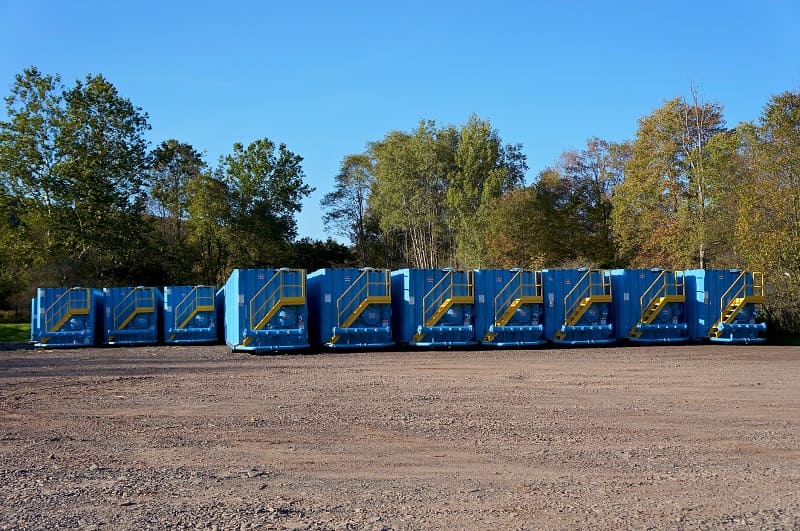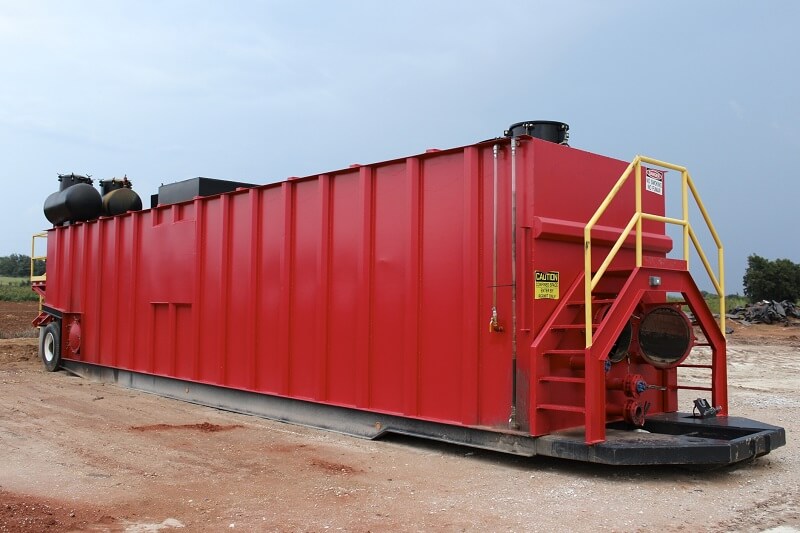Quick Summary: Frac tank rentals provide rapid-response liquid storage for industrial sites handling wastewater, storm surges, or maintenance outages. Paired with roll-off rentals, ideal for debris, sludge, and solid wastes, these on-demand solutions boost operational continuity and ensure environmental compliance. With scalable capacity, quick deployment, and support for regulatory standards like SPCC and RCRA, rental equipment keeps projects on track without the cost or upkeep of permanent infrastructure.
Industrial operations often run smoothly until an unexpected surge in waste or water volume demands more capacity than existing infrastructure can handle. Facilities that want to stay ahead of downtime are increasingly turning to temporary solutions that bridge those gaps.
Frac tank rentals provide flexible liquid storage, and roll off rental services deliver dependable staging for solid waste, sludges, and debris. Together, they create an adaptable system that supports business continuity while protecting environmental and safety standards.
Why On-Demand Rentals Strengthen Industrial Operations?
The scale of modern industry creates demands that fixed infrastructure alone cannot always handle.
According to the U.S. Geological Survey, American industry withdrew about 14.8 billion gallons of water each day in 2015, representing 5% of total daily withdrawals. Sudden surges from storms or planned maintenance can overwhelm treatment plants without additional storage. Frac tank rentals offer a quick solution that matches capacity to demand.
Solid waste volumes are equally striking; in fact, the Environmental Protection Agency reported nearly 600 million tons of construction and demolition debris generated in 2018, more than double the amount of municipal solid waste. Roll off rental makes it easier to manage such streams, giving facilities the ability to separate, cover, and transport material efficiently.
Frac Tank Rentals Supporting Surge Capacity and Compliance
Frac tanks started in the oilfield, but their versatility now makes them a staple in manufacturing, power generation, and remediation work. Standard units hold roughly 21,000 gallons, so sites can spin up extra storage fast during outages, tie ins, or storm driven surges.
Teams also rent frac tanks to isolate wastewater streams flagged for testing, including flows suspected of containing PFAS. With dedicated storage on site, sampling stays clean, chain of custody is simpler, and operations keep moving while lab results come back.
Calculating Storage Requirements
A straightforward method for estimating tank needs begins with inflow rate multiplied by desired retention time, then converted to gallons. Dividing by usable tank capacity yields the number of tanks required.
Consider an inflow of 250 gallons per minute for 10 hours, which equals 150,000 gallons. At 21,000 gallons per tank, about 7 tanks would be necessary, though adding an eighth provides contingency and headspace for rainwater.
Compliance Considerations
Regulations shape how frac tank rentals are used from the first delivery to final pickup. If you are storing oil, the SPCC rule applies, and you need secondary containment sized for the largest tank with extra volume for rainfall.
In practice that can mean a lined berm or portable containment capable of holding a worst case release plus stormwater, with inspections and recordkeeping to match your plan.
When hazardous waste is present, RCRA Subpart J sets the bar. Expect daily checks of tank integrity, documented compatibility reviews, and clear response procedures ready to go.
Many states add their own twists, including lined berms that hold 100% of the tank volume plus freeboard for severe storms. Build these requirements into site plans and rental specs up front so crews stay safe, paperwork stays clean, and operations stay compliant.
Safety is non negotiable and entry into a frac tank often qualifies as a permit required confined space because access is limited and the atmosphere can turn hazardous. Depending on the waste stream and scope of work, projects may also trigger HAZWOPER training and related controls like monitoring, decon, and documentation.
Treat rentals as part of the safety system from day one by folding them into your site plan with permits, atmospheric testing, ventilation, lockout and tagout, rescue readiness, and tight coordination with the provider so equipment, procedures, and people stay in sync.
Practical Ways Roll Off Rental Streamlines Waste Handling

Frac tanks handle liquids, while roll off containers take on solids and dense sludges. Standard capacities run from 15 to 40 cubic yards, with 30 yard boxes often chosen for industrial work. Thanks to quick staging and easy swaps, their portability and volume make them indispensable for facility cleanouts, construction projects, and rapid disaster response.
Controlling Stormwater and Leachate
Industrial stormwater permits under the EPA Multi-Sector General Permit highlight the importance of covering containers. Roll off rental that includes lids or placement under shelters helps reduce rainwater contact and prevents pollutant discharge.
Simple steps such as utilizing liners or sloped pads protect both compliance and operational efficiency.
Transport and Weight Management
Transport regulations play a major role in container use. Federal highway weight limits cap vehicles at 80,000 lb. A 30-yard container filled with damp sludge at 1,600 lb per cubic yard reaches nearly 48,000 lb, not counting the container and tractor. Careful load planning avoids overweight fines and scheduling setbacks.
Cargo securement rules from the Federal Motor Carrier Safety Administration require containers to be immobilized and leak-free during transport. Properly securing roll off rental not only maintains compliance but also reduces the risk of accidents or rejected loads at disposal facilities.
On Demand Rentals That Strengthen Disaster Readiness
Disaster scenarios demonstrate the value of on-demand rental equipment. FEMA guidance stresses the need for debris management sites equipped with containers and tanks.
When storms or accidents generate large volumes of contaminated water or debris, facilities with rental providers on call can react immediately. Frac tank rentals hold runoff while roll off rental manages debris, creating an organized system that keeps recovery operations moving and reduces environmental impact.
Lifecycle Value of Renting Over Buying Industrial Equipment
When budgets are tight and project loads shift, the buy or rent question comes up fast. A life cycle cost analysis keeps the comparison honest by looking at the whole picture, not just sticker price.
Look at the levers that actually move the math: discount future cash flows, be honest about utilization, and account for maintenance, repairs, storage, taxes, and what you can recover at resale. A full life cycle view beats sticker price every time.
If a unit sits idle between projects, renting often wins. You get equipment that is ready to use on day one, with upkeep, inspections, and much of the compliance paperwork handled by the provider. Your maintenance team can stay focused on core work instead of babysitting underused assets.
Rentals also let capacity track demand. Scale up for outages and surge events, scale back when the rush ends, and avoid paying to own gear that is not earning its keep.
FAQs: Frac Tank & Roll Off Rentals
Q: How much does frac tank rental cost?
A: Costs vary by region and duration but typically range $75-$150/day per tank.
Q: Do I need a permit to rent roll-offs?
A: Possibly. Local codes may require permits for container placement, especially in public areas.
Q: Can frac tanks store hazardous waste?
A: Yes, but must meet RCRA requirements with proper containment and inspection protocols.
Keeping Industrial Projects on Track With On-Demand Rentals
Frac tank rentals offer flexible liquid storage during outages, surge events, or specialized wastewater projects, while a roll-off rental provides a safe way to manage debris and sludge.
Backed by more than 30 years in industrial cleaning and waste treatment, Environmental Remedies delivers sustainable solutions with responsive customer-centered service. Reach out for a free quote and let our team help you boost uptime, control costs, and stay compliant on your next project.






